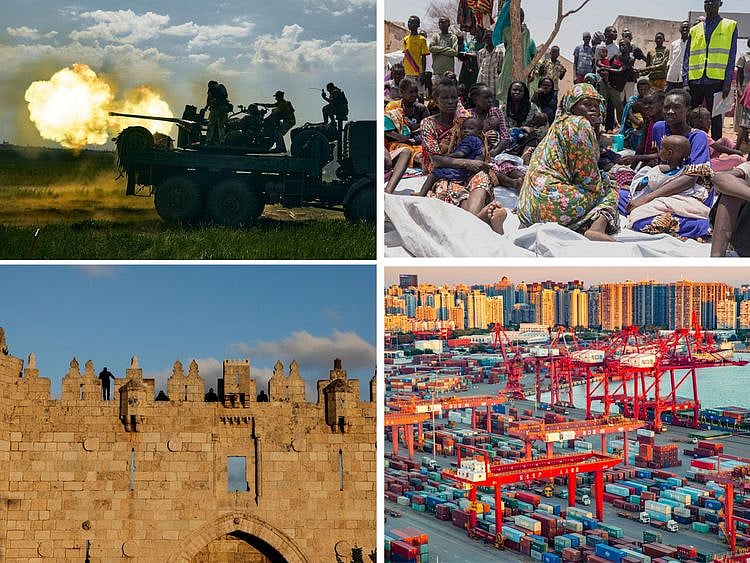Four crises that could make the second half of 2023 a restless one
The escalating geopolitical tensions and crisis can have an impact on global stability

There is a sense of trepidation as we move into the second half of 2023; a feeling that the geopolitical struggle between Russia and the West, especially the United States, is getting out of control as the war in Ukraine enters its 16th month with no sign that either side is ready to compromise or score a decisive victory.
Moreover, the US-China standoff remains at a critical juncture even though there are signs of a possible thaw in ties between Washington and Beijing.
But while reverberations from both crises go beyond immediate borders and far across the globe; affecting supply chains, industrialised economies, vulnerable nations that find themselves in the cross lines, our region too is likely to be impacted by endemic conflicts as well as fresh ones.
The war in Sudan is quickly descending into a civil war that is getting out of control as regional and international intermediaries scramble to secure a long-term ceasefire that would allow for the passage of badly needed humanitarian aid and provide an environment for a political settlement.
A war of attrition
Further north, tensions are running high between Iran backed Hezbollah and Israel. The signing of a new nuclear deal between Iran and the international community is far from reality.
But to the most worrying crisis first, which is the war in Ukraine. The G-7 meeting in Japan last week resulted in a more united stand against Moscow.
The US decision to allow its allies to provide F-16 fighter jets to Kyiv has seen a major shift and escalation of the showdown between Russia and Nato The West’s military support to Ukraine has been instrumental in slowing down the Russian operation. The conflict has turned into a war of attrition with heavy burden on both sides.
The danger that at one point Russia’s Vladimir Putin might be forced to escalate to force Ukraine into submission. It is inconceivable that the current standoff will extend for the remainder of the year. This is a major cause for concern. Aside from negative economic impacts on European economies — Germany has just entered into recession — few more months of this conflict will further push both sides to the edge.
Europe may not see eye-to-eye with Washington regarding raising tensions with China. There is absolutely no logical reason for tensions between the two sides to escalate when dialogue remains the best alternative.
With the war in Ukraine dragging on, there is no reason why the West would seek to isolate Beijing and drive it further towards Moscow. This would be a reckless approach and it appears that the Biden administration is getting the message.
Sudan’s territorial integrity
Closer to home, the conflict in Sudan is getting worse. With either side, being the Sudanese army or the Rapid Support Force (RSF), unable to settle the battle for Khartoum and Omdurman decisively, a brief lull in the war appears like a far cry.
The primary victims are the civilians. A prolonged war between the two means that the country of 45 million and tens of tribes with different affiliations could suffer.
A civil war in Sudan will almost certainly unsettle regional security. Fear that this too could turn into a geopolitical confrontation that spreads beyond the region is real. The Arab world and African nations should step in forcibly to ensure that a political road map is adopted that preserves Sudan’s territorial integrity and implements that Framework Agreement.
And finally, the war of words between Israel and Iran backed proxies in a serious development that countries in the region should seek to end. Hezbollah’s recent show of force can only be seen as a message from Tehran in response to Netanyahu’s messaging.
Israel’s worst fear is that a coordinated response to a raid on Iranian facilities could result in a three frontal attack on Israel; from Lebanon, southern Syria and Gaza. It could also elicit a direct response from Tehran by way of firing long-range ballistic missiles.
Other factors that could affect all four crises would be the outcome of the US presidential elections in 2024. No one really knows how the highly probable election of Donald Trump would mean for Russia-Ukraine war, relations with China and Israel-Iran shadowboxing. In all cases the outlook doesn’t appear too bright and the sense of trepidation about the next six months is warranted.
Osama Al Sharif is a journalist and political commentator based in Amman.
Sign up for the Daily Briefing
Get the latest news and updates straight to your inbox
Network Links
GN StoreDownload our app
© Al Nisr Publishing LLC 2026. All rights reserved.